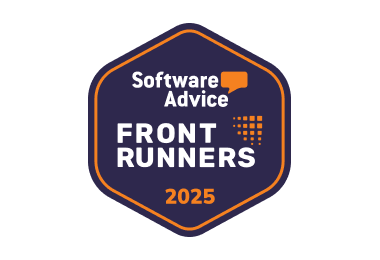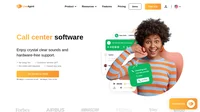The best free call center software
Enjoy unlimited call recordings, callbacks, and IVR starting today.
- ✓ No setup fee
- ✓ Customer service 24/7
- ✓ No credit card required
- ✓ Cancel any time
Used by

Need a free call center software?
According to CCW, 62% of organizations think that the biggest challenge in making future investments will be integrating with a current call center software.
With LiveAgent, it doesn’t have to be a challenge. Add your phone number to LiveAgent and start making and receiving calls through your browser, hardware phone or mobile apps. Store unlimited call recordings in LiveAgent, and utilize them for training or legal purposes.
Start increasing customer satisfaction levels and agent productivity with our free call center software today.
Create FREE account
The FREE account is free forever, but it comes with limited features.
Benefits of a free call center solution
Implement a free call center software for your business and gain these advantages:
Quicker Response Times
Our software includes free ticketing features to help you minimize the total time spent on resolving customer queries.
Single Point of Contact
Your support team can handle all customer requests from multiple channels in one place.
Improved Productivity of your Agents
By managing all support channels in one place, your agents spend less time on monitoring multiple devices.
Free call center software features
LiveAgent’s free call center software saves you tons of time and increases agent productivity. Free your agents of monitoring multiple devices and phone apps. With LiveAgent’s free call center software, all your calls can be dialled and answered within the LiveAgent dashboard or our LiveAgent app. Our free call center software also supports internal calls amongst your agents.
Another core benefit is our call recording feature. This feature allows you store and playback your call recordings for training and legal purposes.

Additional free features
Improve your customer interactions with our free call center software. Apart from call center features, you will also receive a free universal inbox ticketing system, live chat, knowledge base and unlimited agents.
Our free call center software is forever free, but has limitations such as a 7 day ticket search history, 1 email address, 1 phone number and 1 live chat button. If you’re interested in more advanced features or no limits on the number of chat buttons, emails or numbers you can have integrated with LiveAgent, check out our paid plans.
Free call center software erases customer service setbacks
Slow Response Times
12% of Americans rate their number one frustration with customer service as “lack of speed.” Statista
Lack of Clarity Across Media
72% of consumers see having to explain their problem to multiple people as poor customer service. Dimensional Research
Lack of Transparency
72% of consumers say that when contacting customer service they expect the agent to “know who they are, what they have purchased and have insights into their previous engagements.” Microsoft
Try LiveAgent today
A complete guide to the free call center software
Call centers are pivotal for customer support, and finding the right software can elevate your service without breaking the bank.
Free call center software has revolutionized how businesses interact with customers, offering robust solutions without the hefty price tag. Understanding the essential features and benefits is crucial for any organization looking to enhance their customer service capabilities.
In this guide, we will explore the best free call center software options available in 2025, spotlighting LiveAgent as the leading solution. Whether you’re setting up a new call center or upgrading your current system, this article provides actionable insights to help you make the right choice for your needs.
- What is free call center software
- Key features to look for in free call center software
- Benefits of using free call center solutions
- Types of call center solutions
- Top free call center software options in 2025
- LiveAgent: Best Overall Software
- HubSpot CRM: A comprehensive solution
- Freshdesk contact center: Intuitive and user-friendly
- Zoho Desk: Multi-channel support for enterprises
- Bitrix24: All-in-one collaboration tool
- PhoneBurner: Efficient power dialing
- VirtualPBX: Solid VoIP features
- RingCentral: Reliable communication platform
- Dialpad: Modern interface with AI capabilities
- CloudTalk: Versatile and affordable
- Integration with CRM systems: Enhancing customer interaction
- Free vs paid call centers – the differences
- Tips for Implementing free call center software
- Frequently asked questions
- What should I look for in free call center software?
- Can free call center software handle concurrent calls?
- Is an internet connection necessary for call center software?
- Do free call center solutions offer advanced features?
- How do free call center tools integrate with sales processes?
What is free call center software
Many customers still prefer to call customer support reps when they need to have their issues resolved quickly. Thus, if you want to provide outstanding customer service for your customers, building a virtual call center is a great way to get started.
Setting up and maintaining your own contact hub is easier than you think. You just need to get help from some of the best-rated call center tools on the market. Using top call center software can help you streamline operations, reduce unanswered calls, and improve overall customer satisfaction.
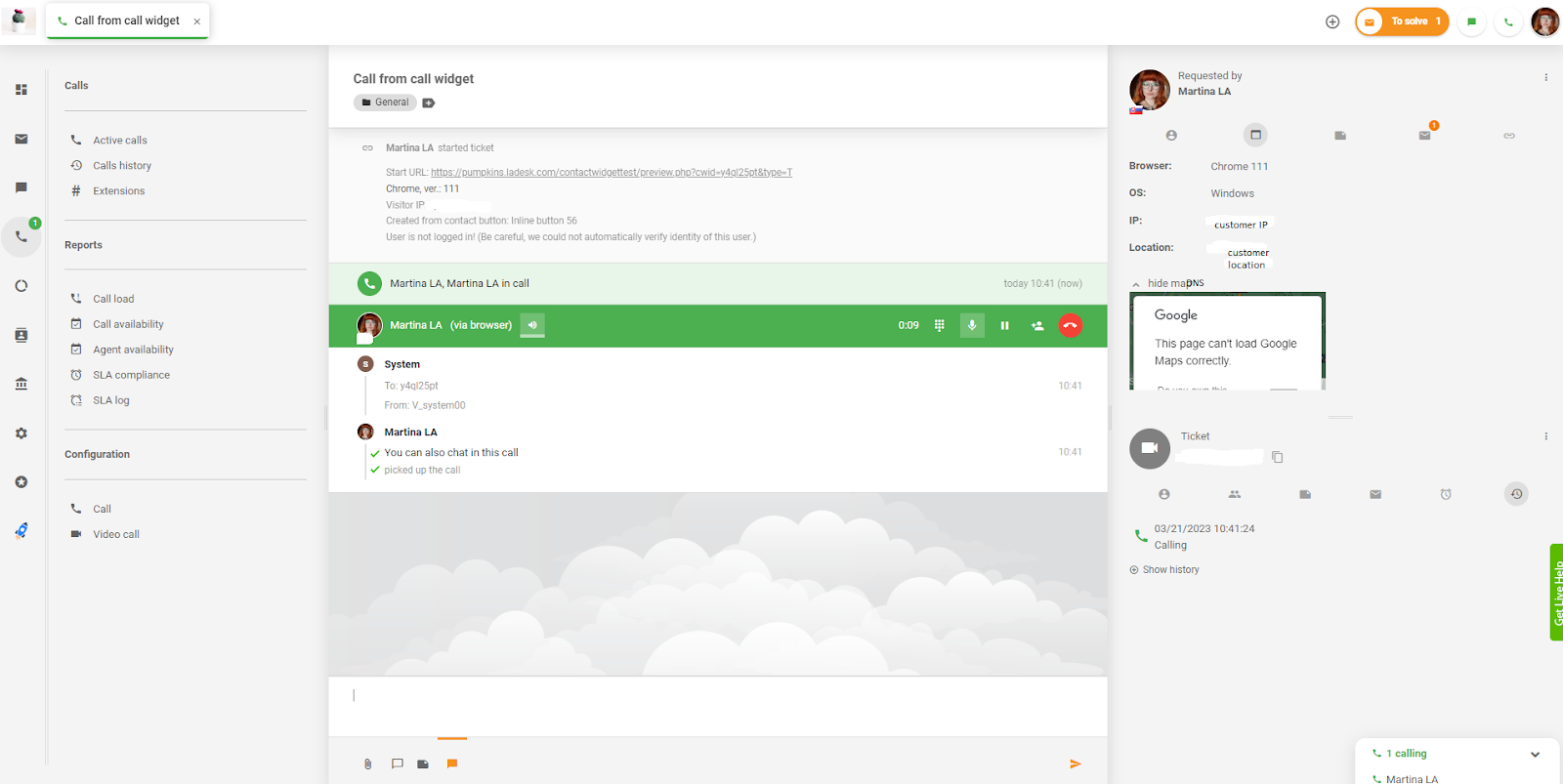
A piece of free call logging software for your help desk might be slightly more difficult to find. However, it’s definitely worth it if you can find one that suits your business needs.
Now, let’s take a look at why phone call software is important to use. Furthermore, how you can make the most of it, regardless of choosing a paid or a free automated calling system.
Key features to look for in free call center software
When selecting free call center software, certain key features are critical for enhancing customer interactions and overall customer satisfaction. Essential features to consider include inbound and outbound calls management, allowing center agents to handle multiple communication channels effectively. This flexibility ensures efficient response time for both incoming and outgoing customer queries.
Advanced features like Interactive Voice Response (IVR), real-time analytics, and reporting tools are vital for improving center performance. IVR systems empower customers to navigate through options independently, streamlining the customer services process.
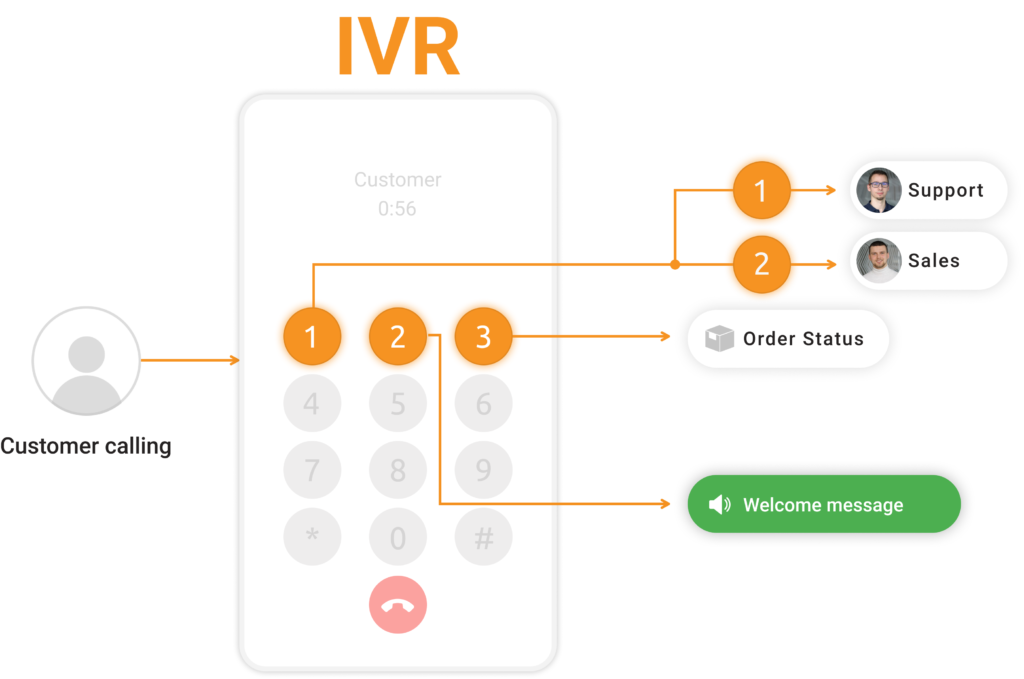
Real-time analytics tools provide actionable insights into the sales process and customer relationship management, thereby aiding in strategic decision-making for sales teams and improving customer experience.
Integration capabilities with desk software and other digital channels are also important. A seamless integration enables a virtual phone system that supports concurrent calls, ensuring that communication is uninterrupted and fully managed. Additionally, consider software that offers a reliable internet connection to support all functionalities, aiding in maintaining a consistent level of service.
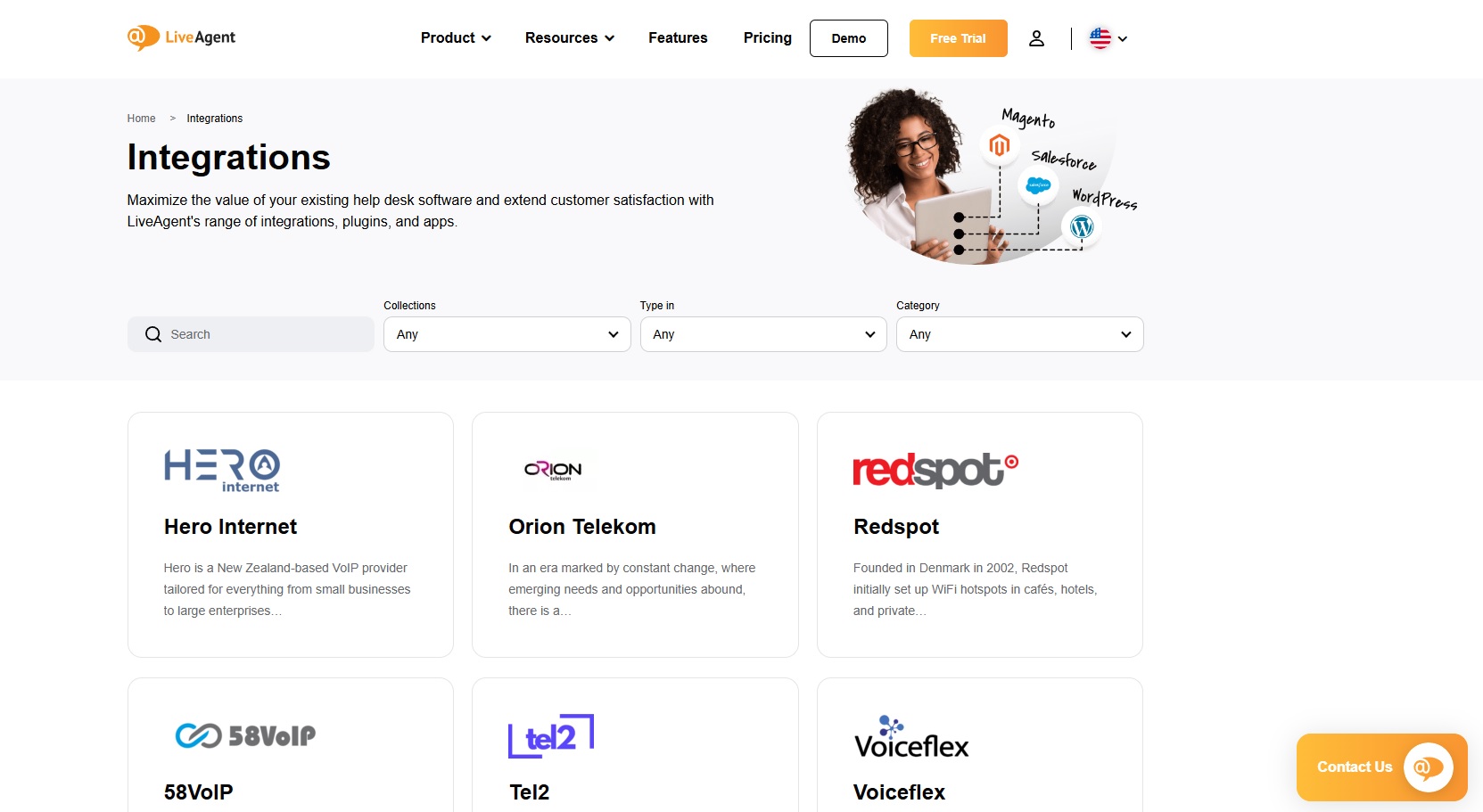
In summary, free call center software should offer capabilities for efficient management of customer interactions, robust IVR systems, integration of digital channels, and provide insightful analytics to support optimal performance of center agents.
Benefits of using free call center solutions
Free call center solutions present a range of noticeable benefits for businesses looking to enhance their customer interactions without hefty investments. Analytics tools help managers make data-driven decisions to enhance performance and improve customer satisfaction. Call center free software often includes essential features such as interactive voice response, real-time customer relationship management, and cloud solutions.
One of the primary advantages is cost-efficiency. Leveraging these software solutions doesn’t require substantial financial commitments, making them ideal for startups or small businesses. Moreover advanced features like analytics tools and real-time monitoring are essential for effective customer service.
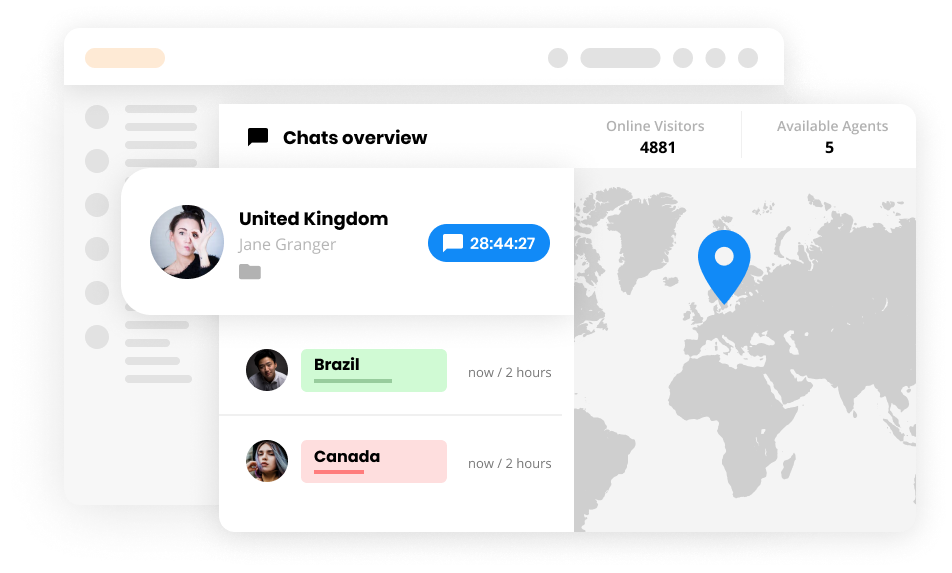
Another benefit is the improvement in customer services, response time, and ensuring a positive experience for your customers. With the help of center agents, businesses can handle concurrent calls more effectively, leading to enhanced customer experience. Options like LiveAgent even offer advanced center software solutions with actionable insights, improving the overall sales process and helping sales teams achieve their targets efficiently.
Providing exceptional service ensures a positive experience and helps build strong customer loyalty. Choosing the right free call center software can transform how a business handles customer interactions, ensuring a smoother, more responsive service platform.
Types of call center solutions
Modern Contact Centers are categorized as inbound, outbound, multichannel, or omnichannel, each serving specific business needs.
First, we must acknowledge the difference between on-premise call centers and virtual systems. As the name suggests, everything in an on-premises call center is located “on the premises” – be it software, hardware, servers, and even the customer support team.
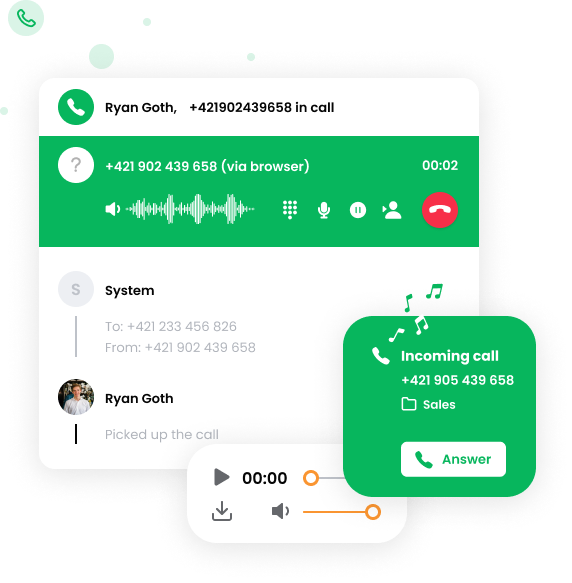
Virtual call centers leverage VoIP and cloud solutions ensure seamless operations for virtual agents and allow businesses to scale effectively.
Nowadays, call centers are often categorized as:
- Inbound call centers designed to receive incoming calls.
- Outbound call centers focused on outgoing calls. Usually, agents work with a contact list of existing and/or potential customers who they call.
- Multichannel contact centers that cover multiple channels. Such centers still use phone calls as one of their communication channels, which are a part of a larger suite of communications tools.
- Omnichannel contact centers take multichannel support to the next level. They offer a unified customer service strategy across all channels, usually thanks to a single tool that is capable of bringing all communications under one roof.
Finally, there’s also a distinction between paid vs free Contact Center solutions, each with unique advantages.
Top free call center software options in 2025
Choosing the best free call center software can redefine your customer interactions and elevate the customer experience in 2025. Among various free options, LiveAgent stands out as a comprehensive solution with advanced features and a user-friendly interface.
Offering both inbound and outbound calls, LiveAgent caters to a wide range of communication channels, ensuring your customer service is both streamlined and efficient.
For those seeking advanced features without a hefty price tag, consider alternatives like Freshdesk and Zoho Desk. Each offers essential features to improve response time and customer satisfaction. However, LiveAgent’s superior combination of intuitive design and robust center platform makes it the top choice for companies focused on enhancing customer interactions with the help of free software solutions.
LiveAgent: Best Overall Software
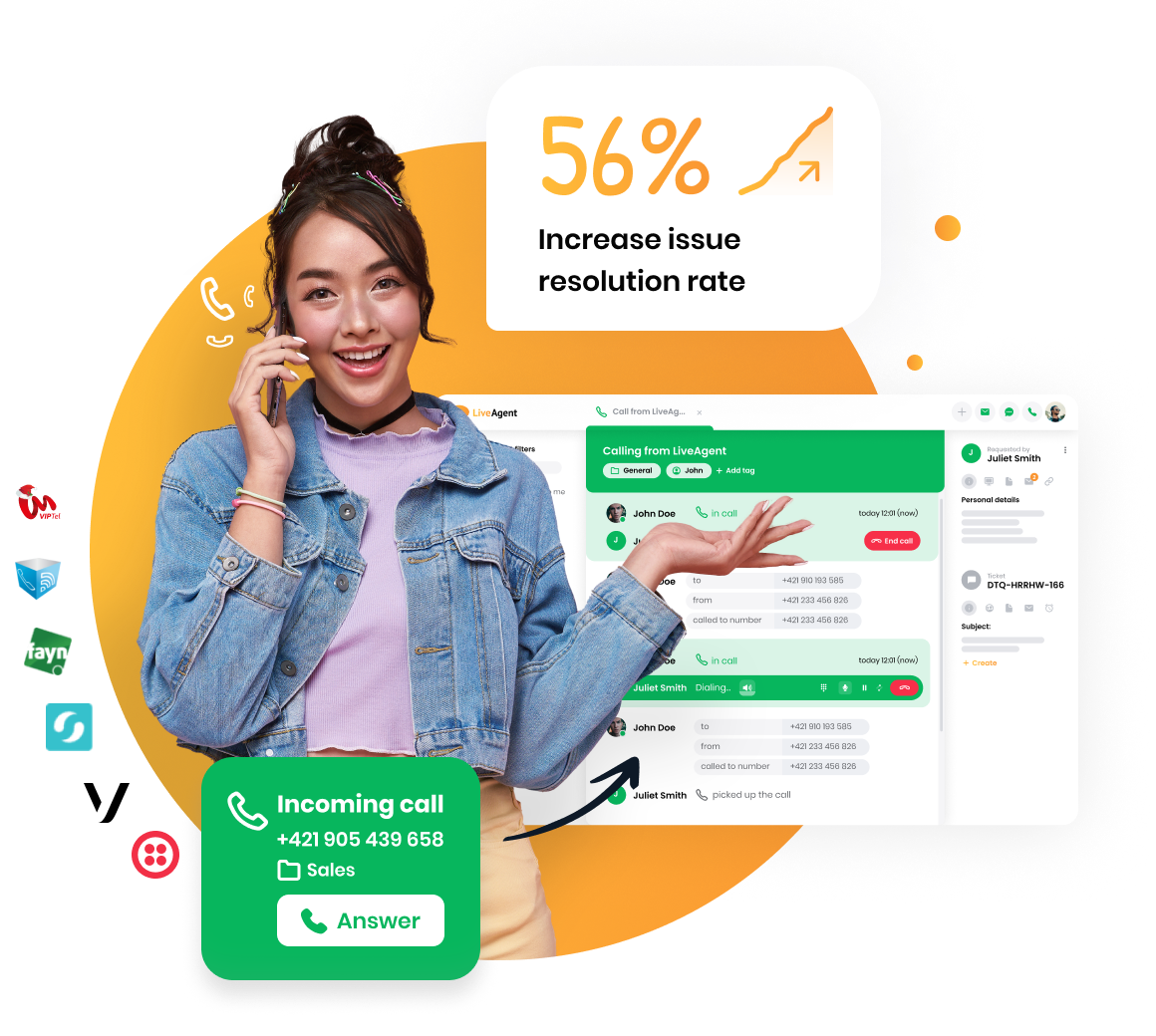
LiveAgent stands out as the best overall free call center software, designed to streamline and enhance customer interactions through its robust and user-friendly features. It effectively supports both outbound and inbound calls, ensuring seamless communication and improved customer experience.
With LiveAgent, your team can manage customer queries efficiently, thanks to real-time tracking and a comprehensive customer relationship management system.
The software offers essential features such as interactive voice response, integration across digital channels, and an intuitive virtual phone setup, all without compromising on quality.
Its flexibility and reliable internet connection requirements make it a top choice for any business size, particularly benefitting remote sales teams to enhance their sales process.
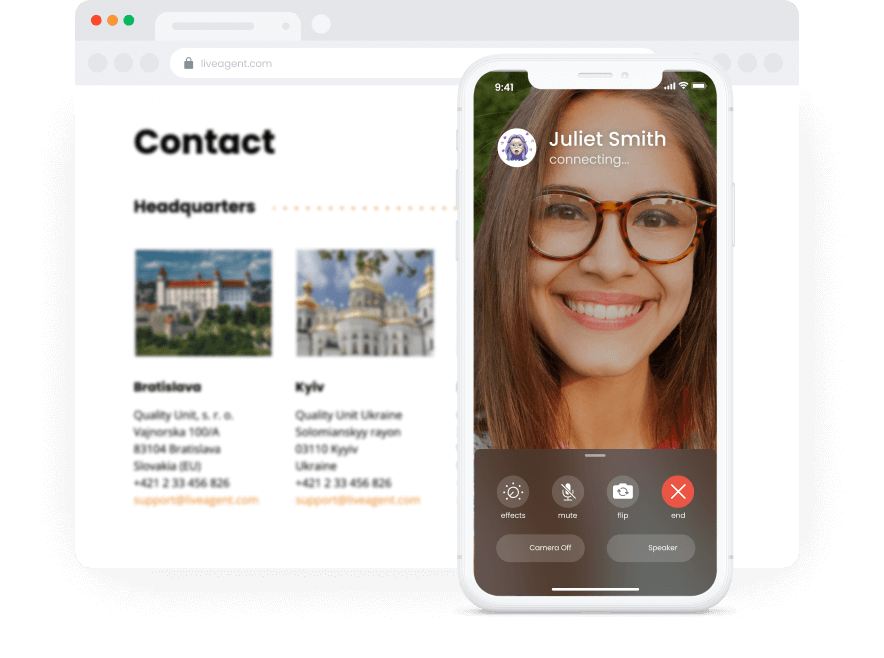
LiveAgent’s accessible help desk software and center platform are perfect center solutions for those seeking free software with the capability of a premium package. It not only manages communication channels effectively but also provides actionable insights to enhance customer services.
Whether it’s for improving customer service or elevating overall business operations, LiveAgent offers a comprehensive free solution unrivaled by other center software providers.
HubSpot CRM: A comprehensive solution
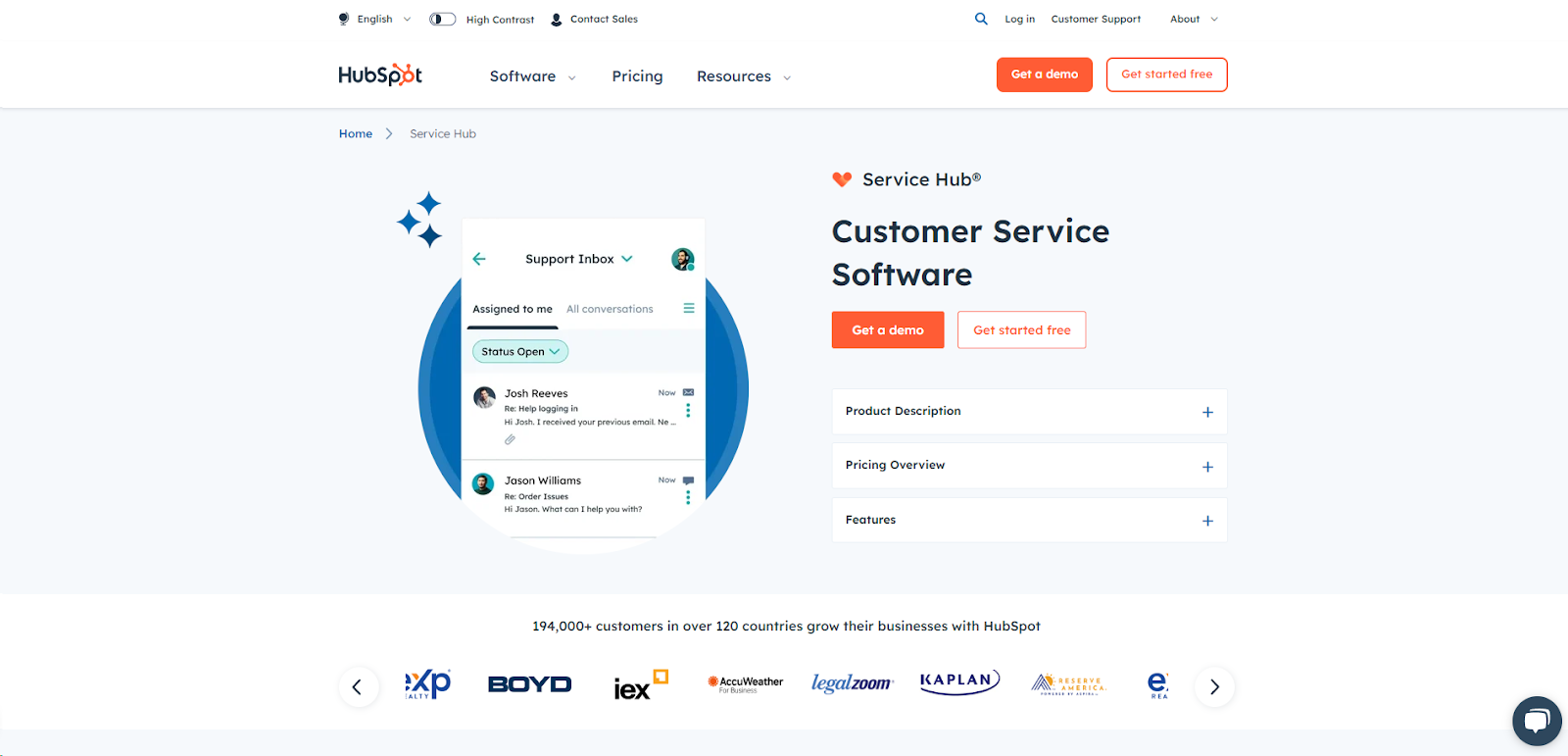
HubSpot CRM offers a comprehensive solution for businesses looking to enhance their customer relationship management efficiently. It’s designed to streamline operations with its user-friendly interface, making it accessible for all team members. The software includes essential features like contact management, pipeline tracking, and sales automation, ensuring a robust foundation for managing customer interactions.
One of the standout aspects of HubSpot CRM is its seamless integration with a wide range of digital channels, including email and social media. This facilitates better communication between sales teams and customers, ultimately improving the customer experience.
Furthermore, HubSpot provides valuable insights through detailed analytics, allowing businesses to refine their sales process and boost customer satisfaction.
With real-time data updates, businesses can make informed decisions swiftly. HubSpot CRM is not just a tool but a strategic partner that empowers companies to improve their response time and overall customer service. Its ability to cater to both inbound and outgoing communications makes it a compelling choice for companies seeking a versatile CRM platform.
Freshdesk contact center: Intuitive and user-friendly
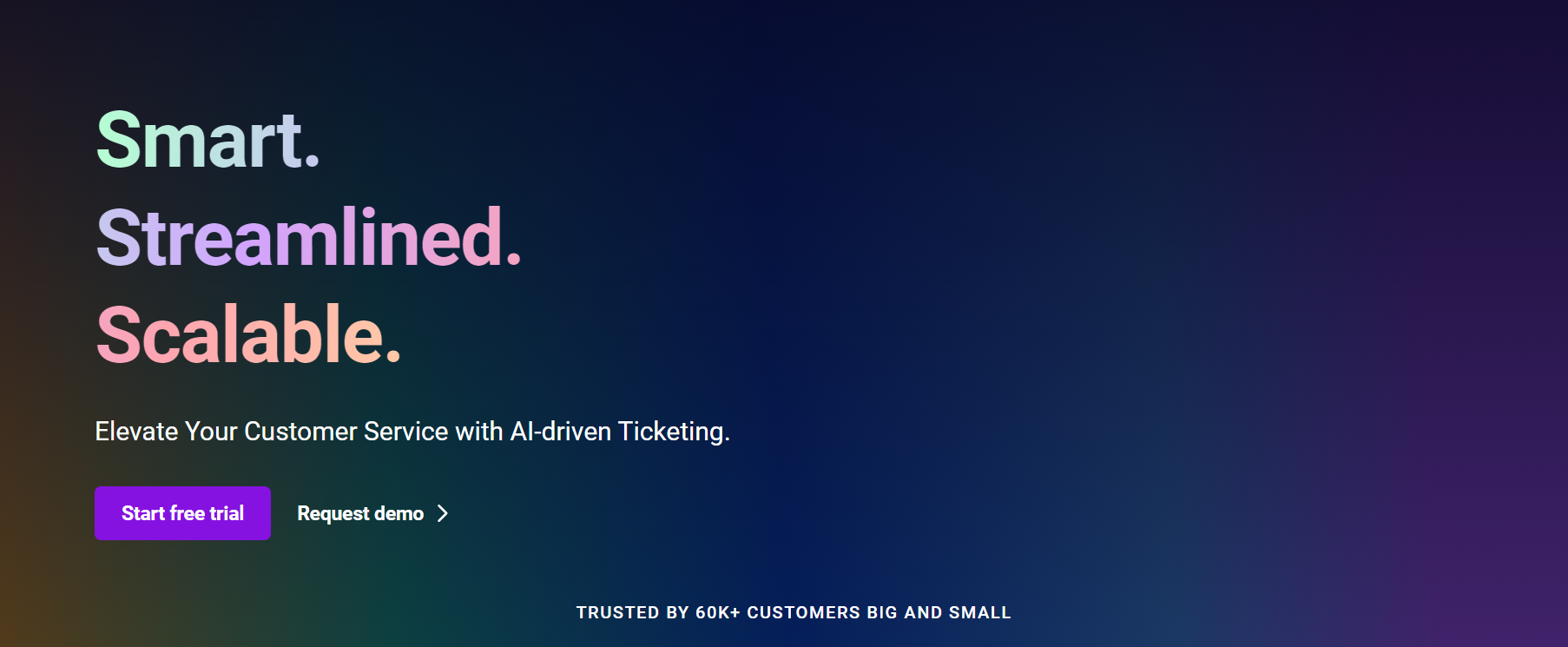
Freshdesk Contact Center is recognized for its intuitive platform, reducing the learning curve for new agents and enhancing efficiency An intuitive platform helps streamline agent workflows, enabling faster resolution of customer inquiries. Its simplicity reduces the learning curve for new center agents while maintaining robust functionality for advanced users.
Key features of Freshdesk Contact Center include real-time call monitoring, interactive voice response (IVR), and built-in customer relationship management (CRM) tools, all accessible through an internet connection.
These tools enhance the overall customer experience by improving response times and facilitating efficient handling of customer queries across multiple communication channels.
Furthermore, Freshdesk offers integration with digital channels and popular desk software, enabling sales teams to manage concurrent calls and track their sales process effectively.
This integration is pivotal in boosting customer satisfaction by providing quick resolutions and fostering better customer services. For those seeking a straightforward, yet powerful call center solution, Freshdesk Contact Center represents a blend of essential features tailored for optimal customer care and interaction.
Zoho Desk: Multi-channel support for enterprises
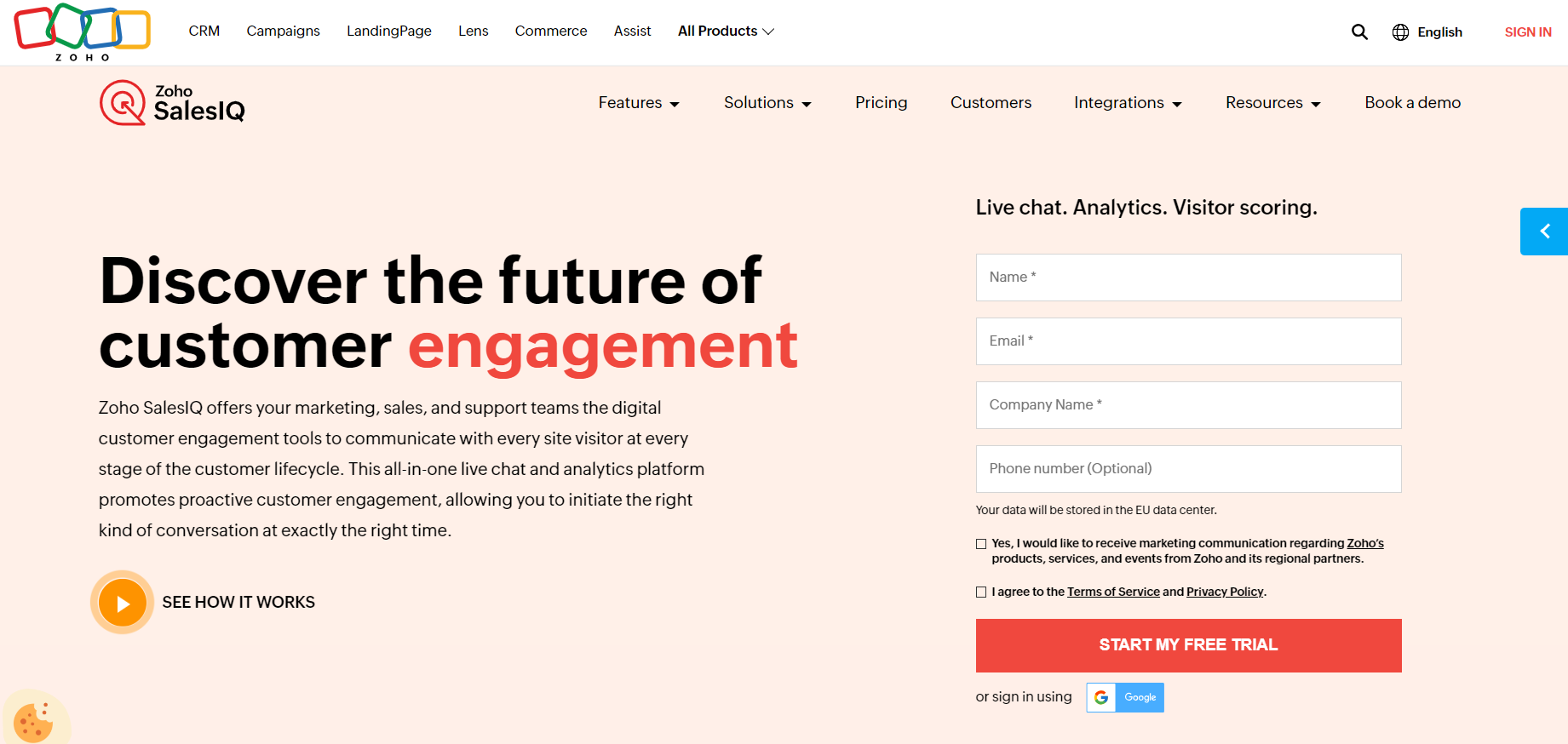
Zoho Desk offers multi-channel support designed to enhance enterprise customer interactions effectively. With Zoho Desk, businesses can manage all customer queries across various communication channels including email, social media, and live chat.
This integration ensures that customer service agents can handle inbound calls, concurrent calls, and digital channels seamlessly, improving overall customer experience.
Key features of Zoho Desk include an interactive voice response system and robust customer relationship management tools that facilitate efficient handling of customer services.
The platform supports real-time analytics and offers actionable insights, helping companies optimize their response time and improve customer satisfaction. Moreover, Zoho Desk’s internet connection-based platform ensures efficient desk software operations, crucial for enterprises with high-volume support needs.
This makes Zoho Desk a strong center software solution, fostering an environment of effective communication and excellent customer service performance.
Bitrix24: All-in-one collaboration tool
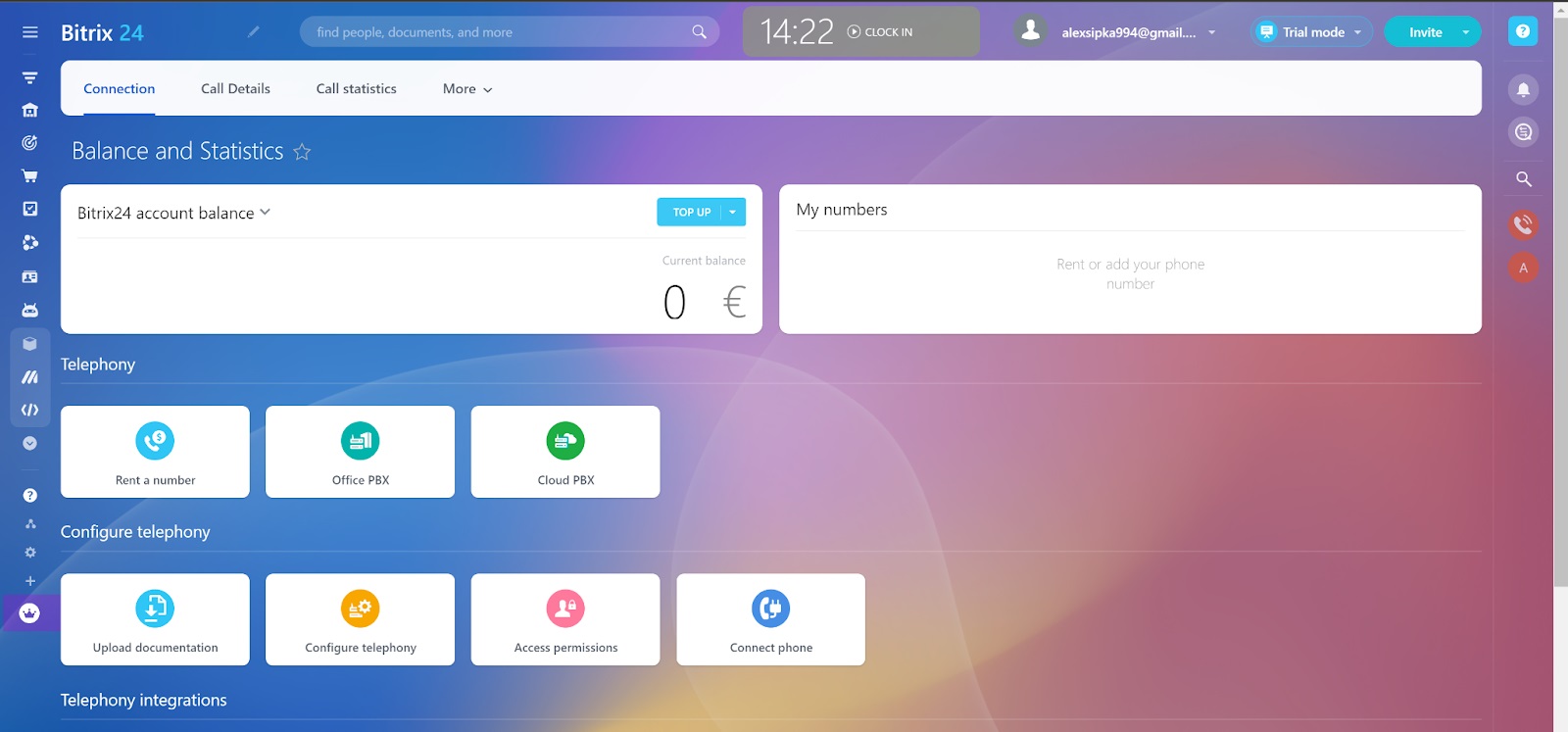
Bitrix24 is an all-in-one collaboration tool designed to streamline communication and project management within organizations of all sizes. It combines various functionalities such as task management, project planning, document sharing, and team communication into a single platform.
One of Bitrix24’s key features is its CRM system, which helps businesses manage customer interactions and track sales processes effectively. Additionally, Bitrix24 offers tools like chat, video conferencing, and document collaboration, making it easier for teams to stay connected and work together seamlessly.
The software’s intuitive interface ensures that users, even those with minimal technical expertise, can easily navigate its features.
The platform supports an array of digital channels, offering flexibility and scalability for businesses as they grow. Bitrix24 is particularly appealing to small and medium enterprises due to its combination of essential tools and cost-effective pricing model. Whether you need to manage inbound or outbound calls, handle customer queries, or maintain high customer satisfaction, Bitrix24 offers a comprehensive solution to meet those needs.
PhoneBurner: Efficient power dialing
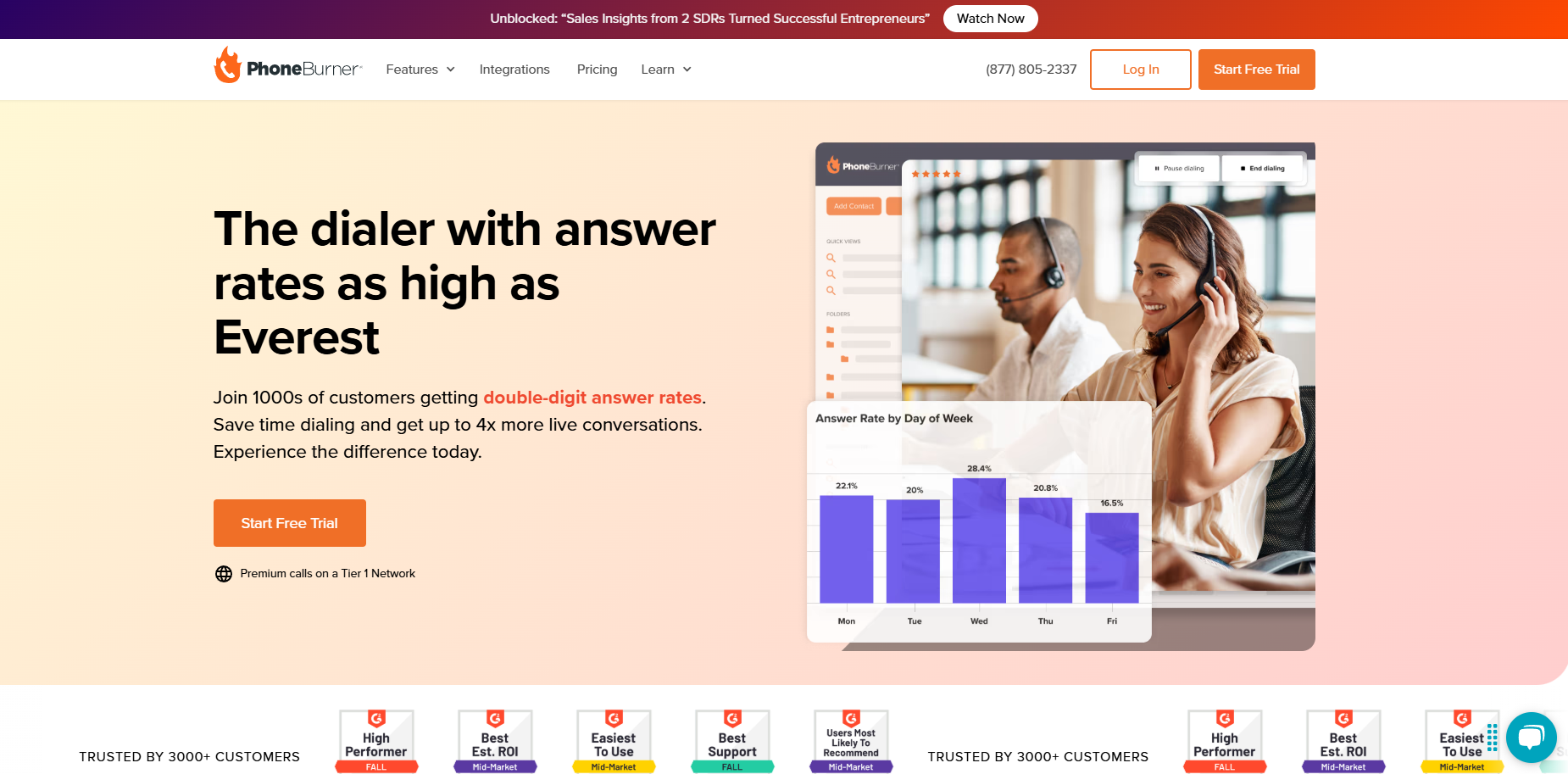
PhoneBurner is a powerful tool designed to boost efficiency in outbound call centers through its power dialing capabilities. It speeds up the sales process by enabling agents to make up to 80 calls per hour without the need for hardware installations. This seamless cloud-based solution reduces downtime between calls, leading to increased productivity and more completed conversations.
Key features of PhoneBurner include advanced call tracking, CRM integration, and real-time reporting, which provide actionable insights into customer interactions and performance metrics.
The platform supports various communication channels and is accessible via an internet connection, ensuring flexibility and mobility for sales teams. With its built-in email and SMS communication tools, agents can enhance customer satisfaction by delivering prompt and personalized follow-ups.
By streamlining outbound calls and integrating with existing customer relationship management systems, PhoneBurner effectively improves response times and customer experience. Additionally, its user-friendly interface and intuitive features make it an ideal choice for center agents seeking an efficient and scalable call center software solution.
VirtualPBX: Solid VoIP features
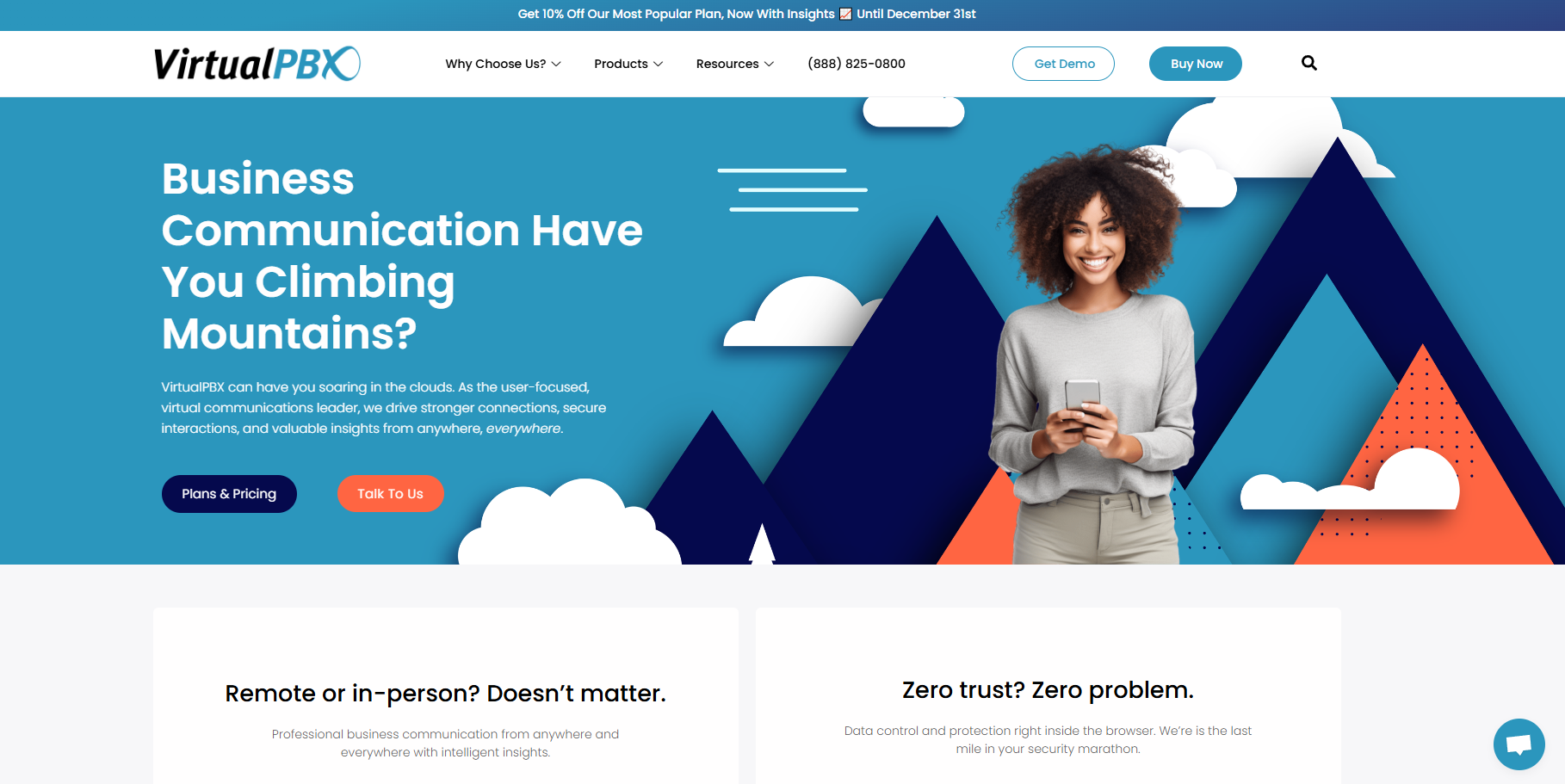
VirtualPBX is a robust VoIP solution renowned for its solid features that enhance communication efficiency. It offers an array of essential features like call routing, voicemail to email, and simultaneous ringing, ensuring seamless connectivity for businesses of all sizes. The platform supports both inbound and outbound calls, enabling organizations to maintain fluid communication with their customers.
One of VirtualPBX’s standout features is its advanced call management system. This includes smart call queuing and an interactive voice response (IVR) system, which streamlines customer interactions by directing inquiries to the appropriate departments swiftly.
Additionally, the real-time dashboard gives users a comprehensive overview of call activity, allowing for improved response time and customer satisfaction.
Moreover, VirtualPBX’s compatibility with digital channels ensures versatile communication options such as virtual phone numbers and internet-based calls. This adaptability makes it an excellent choice for remote teams, facilitating effective customer relationship management and enhancing the overall customer experience.
RingCentral: Reliable communication platform
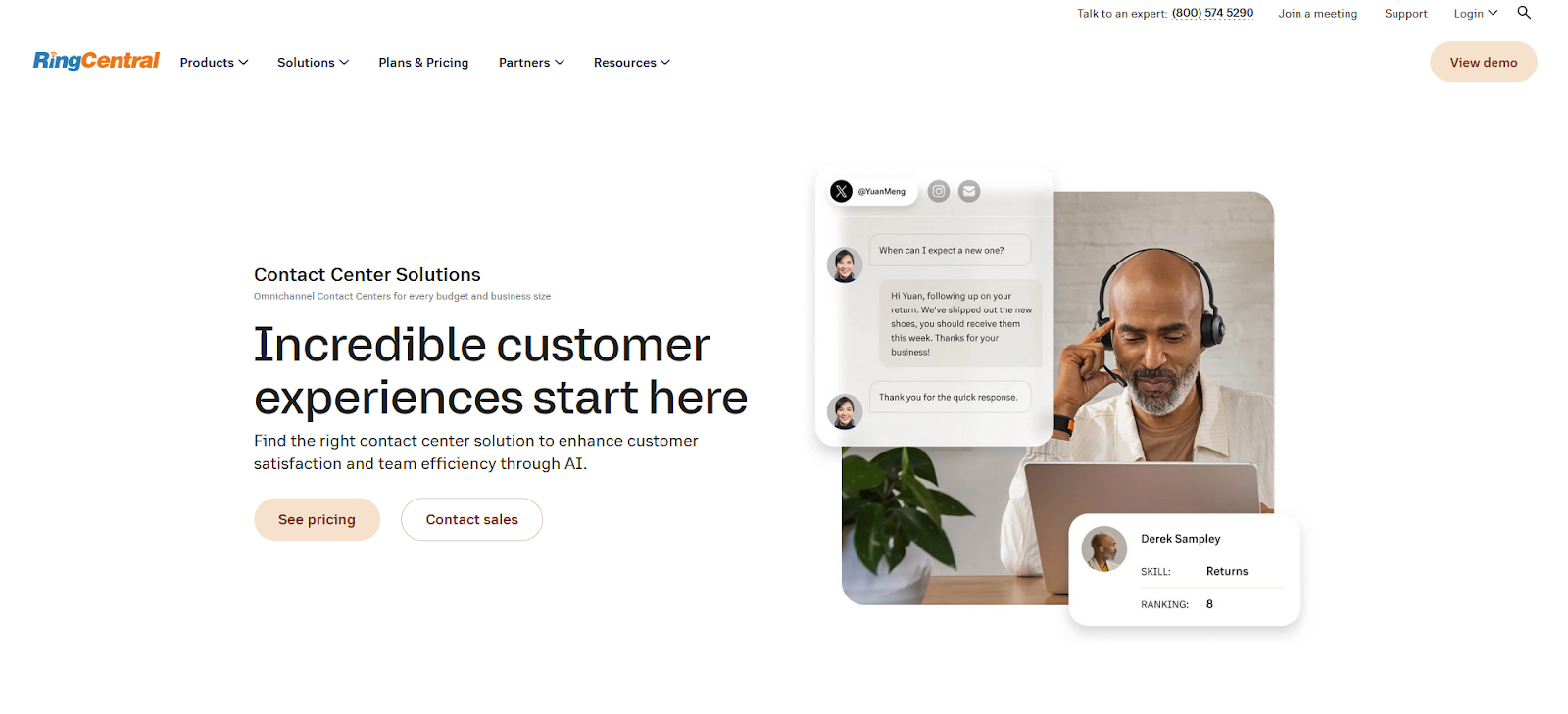
RingCentral is a reliable communication platform known for its comprehensive suite of features that cater to businesses of all sizes. It seamlessly integrates voice, video, and messaging services, making it an efficient tool for managing customer interactions. With robust capabilities for handling inbound and outbound calls, businesses can significantly enhance their customer experience and streamline communication processes.
One of RingCentral’s essential features is its interactive voice response (IVR) system, which optimizes call routing and reduces response time. This feature, combined with its customer relationship management integration, ensures that center agents have all necessary customer information at their fingertips, improving customer satisfaction and operational efficiency.
In addition to traditional communication channels, RingCentral supports digital channels and virtual phone systems, making it a versatile solution for modern sales teams. Its advanced features, such as real-time analytics and Artificial Intelligence-driven insights, empower businesses to refine their sales process and improve customer service.
Dialpad: Modern interface with AI capabilities
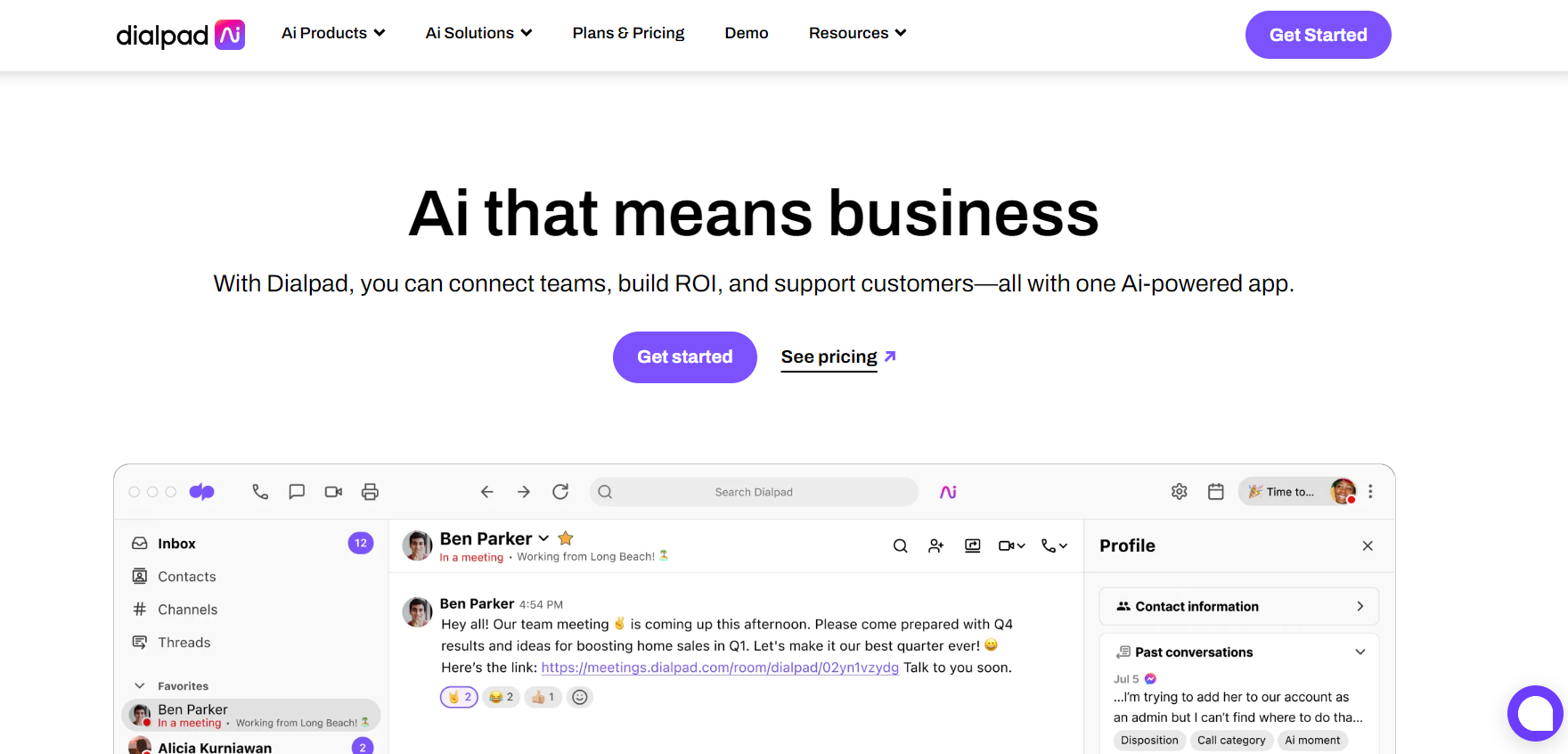
Dialpad stands out with its modern interface and advanced AI capabilities, making it a prominent player in the call center software arena. Designed for both ease of use and efficiency, Dialpad’s interface is intuitive, allowing center agents to navigate seamlessly through inbound and outbound calls. Its AI features provide real-time transcriptions and sentiment analysis, enhancing customer interactions and boosting customer satisfaction.
The software also supports multiple communication channels, fostering a comprehensive customer relationship management experience. Key features include a virtual phone system and interactive voice response (IVR), which streamline both concurrent calls and customer queries efficiently. Dialpad’s AI capabilities assist sales teams with actionable insights, improving the sales process and response time.
Dialpad’s compatibility with various essential features like an internet connection and digital channels ensures it meets the demands of modern customer services. This robust center platform not only aids in managing customer interactions but also contributes to increased customer satisfaction due to reduced wait times and more personalized service.
CloudTalk: Versatile and affordable

CloudTalk offers a versatile and affordable solution for businesses seeking efficient call center software. It is designed to handle both inbound and outbound calls seamlessly, making it ideal for enhancing customer interactions and improving overall customer experience. With essential features like interactive voice response and customer relationship management integration, CloudTalk supports center agents in managing customer queries effectively.
The platform excels in providing advanced features such as virtual phone numbers and real-time analytics, catering to the needs of sales teams and customer service departments alike. It supports multiple communication channels and allows for concurrent calls, ensuring that businesses never miss an opportunity to connect with their customers.
CloudTalk’s internet-based solution ensures reliability and quick response times, contributing to increased customer satisfaction. It is an excellent option for companies looking to improve their customer services with an efficient and cost-effective call center software solution.
Integration with CRM systems: Enhancing customer interaction
Integration with CRM systems significantly boosts customer interaction by linking customer data with communication channels like inbound and outbound calls. This connectivity enhances the ability of call center agents to access customer history and preferences, resulting in improved personalized service and elevated customer satisfaction.
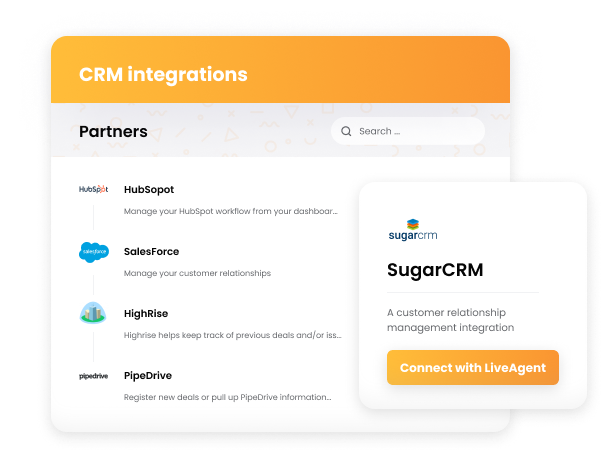
An integrated CRM allows real-time access to essential features, enabling agents to quickly retrieve customer information and efficiently handle customer queries. This access is crucial for reducing response time and enhancing the customer experience during concurrent calls.
Key features of CRM integration include the synchronization of customer data, streamlining customer relationship management, and supporting advanced features such as interactive voice response and virtual phone systems. These integrations empower sales teams to manage leads more effectively, leveraging customer interactions to drive a seamless sales process across digital channels.
Free vs paid call centers – the differences
Not every call center tool has the same features. Moreover, software providers also have different pricing options, including free call center software plans, depending on your needs. It’s important to realize that different solutions come with different features and limitations and that it’s up to you to choose the best calling software for your needs. In order to make an informed choice, you might want to research all of the available options first.
With free call center systems, you can still easily dial and answer all your calls, including internal calls between agents.
Additional features such as call recording and routing will vary, or be subject to certain limitations. For example, a piece of free call logging software for your helpdesk can help you store information about your callers. However, there may be a limited ticket search history or a limited number of phone numbers that you can utilize within the software. If you’re interested in using more advanced features or having no limits then you should look into paid plans instead.
In contrast to free automated calling software, paid systems are a better fit for larger companies that handle a lot of calls and strive to offer outstanding customer support both over the phone and across other channels. There’s a variety of solutions to choose from, and they aren’t necessarily all particularly pricey. Simply consider all your needs, test out at least a few different tools with free trial periods, and take into account all of the pros & cons that you can identify.
The flexibility in fulfilling business requirements makes Live Agent the preferred free call center software for small businesses, solopreneurs, and start-ups.
Tips for Implementing free call center software
Implementing free call center software can significantly enhance your customer service operations without incurring additional costs. Start by assessing your organization’s needs, focusing on key features such as handling inbound and outbound calls, customer interaction management, and essential communication channels. Understanding these needs will guide you in selecting software tailored to improve customer satisfaction and streamline your center solutions.
Ensure seamless integration with existing systems like customer relationship management (CRM) tools. This allows center agents to access customer information in real time, enhancing the overall customer experience. Prioritize software with advanced features such as interactive voice response and virtual phone capabilities, which can automate routine tasks and improve response times.
Training your team on the chosen software is crucial. Offer hands-on training sessions to ensure agents can efficiently use the new platform, boosting customer queries resolution and the sales process.
Lastly, test the software under various conditions, like managing concurrent calls over different digital channels, to ensure it operates effectively with a stable internet connection. By following these tips, you can successfully implement free call center software and optimize your call handling operations.
Frequently asked questions
What should I look for in free call center software?
When choosing free call center software, prioritize essential features such as inbound and outbound call handling, multi-channel communication, and real-time analytics. These key features enhance customer interactions and support efficient center operations.
Can free call center software handle concurrent calls?
Yes, most free call center solutions can manage concurrent calls. However, the number of calls may be limited compared to paid versions. It’s advisable to evaluate if the software can scale with your business needs.
Is an internet connection necessary for call center software?
Yes, a stable internet connection is crucial for operating call center software, especially those that are cloud-based. This ensures smooth customer experiences and uninterrupted service during phone calls or digital interactions.
Do free call center solutions offer advanced features?
While features may vary, many free solutions do include advanced functionalities such as interactive voice response and basic customer relationship management tools. For comprehensive features, consider assessing solutions like LiveAgent, known for its robust offering even in its free version.
How do free call center tools integrate with sales processes?
Free call center tools often integrate easily with customer relationship management platforms to streamline sales processes and improve response times. They enable sales teams to manage customer queries and enhance overall customer satisfaction.
Provide excellent customer service
Discover unparalleled customer support with LiveAgent's all-in-one software. Benefit from 24/7 service, a free trial without a credit card, and seamless integration across 130+ ticketing features. Enhance your business with fast setup, AI assistance, live chat, and more. Choose LiveAgent for exceptional service and satisfied customers.
You will be
in Good Hands!
Join our community of happy clients and provide excellent customer support with LiveAgent.

Our website uses cookies. By continuing we assume your permission to deploy cookies as detailed in our privacy and cookies policy.
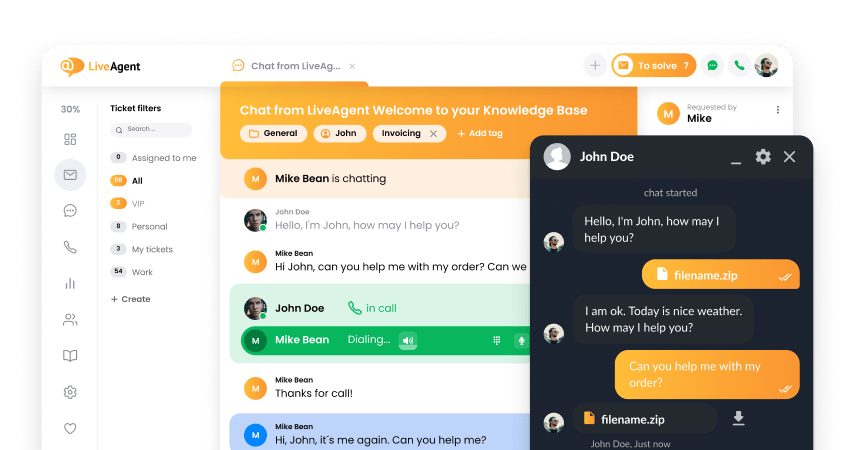
- How to achieve your business goals with LiveAgent
- Tour of the LiveAgent so you can get an idea of how it works
- Answers to any questions you may have about LiveAgent

 Български
Български  Čeština
Čeština  Dansk
Dansk  Deutsch
Deutsch  Eesti
Eesti  Español
Español  Français
Français  Ελληνικα
Ελληνικα  Hrvatski
Hrvatski  Italiano
Italiano  Latviešu
Latviešu  Lietuviškai
Lietuviškai  Magyar
Magyar  Nederlands
Nederlands  Norsk bokmål
Norsk bokmål  Polski
Polski  Română
Română  Русский
Русский  Slovenčina
Slovenčina  Slovenščina
Slovenščina  简体中文
简体中文  Tagalog
Tagalog  Tiếng Việt
Tiếng Việt  العربية
العربية  Português
Português 

